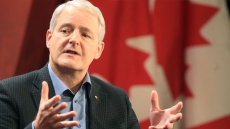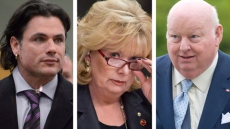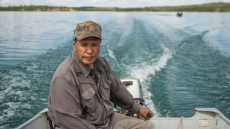VANCOUVER — When rainbow flags and noisy revellers fill Vancouver's Davie Street for the city's annual Pride Parade on Sunday, there's one political leader who will be conspicuously absent: Premier Christy Clark.
The British Columbia Liberals have refused to sign a pledge that calls for new legislation to protect transgender people, as required by organizers, and therefore will not be allowed to march. Clark has said that B.C.'s Human Rights Code already ensures equality for all.
In fact, B.C. is among only a few provinces that have not amended their human rights legislation to provide specific protections for transgender people. Since 2012, six provinces — including Ontario, Manitoba and Saskatchewan — and one territory have moved to do so.
"You'd think B.C. would maybe have some shame that it's not working to support human rights while the rest of Canada is," said Spencer Chandra Herbert, an Opposition New Democrat member of the legislature.
Chandra Herbert has tried three times to introduce a bill to add "gender identity, and gender expression" to the Human Rights Code's list of banned forms of discrimination, which already includes sex, race and sexual orientation.
"It's five words and a comma," he said. "It wouldn't cost the government anything to do and it would make a world of difference for transgender people."
The Vancouver Pride Society announced in May that it would require parade participants to sign a transgender equality pledge. The document declares the signee supports new federal and provincial legislation to protect transgender and gender-variant people from discrimination.
Justice Minister Suzanne Anton said on Thursday that B.C.'s Human Rights Code is interpreted to include transgender people. Specifically, she pointed to section 3, which includes the promotion of "a climate of understanding and mutual respect where all are equal in dignity and rights."
"The law is crystal clear — transgendered people are protected — and I urge all British Columbians to recognize and accept the diversity of all people and to treat them with the respect they deserve," she said in an emailed statement.
Cheri DiNovo, an Ontario New Democrat, said specific legal protections are needed. She attempted to amend the province's human rights code five times before Ontario became the first in Canada to include "gender identity" and "gender expression" in 2012.
She called the B.C. Liberals' stance "regrettable," pointing to statistics that show about half of transgender people attempt suicide.
"The next suicide could be prevented. And you could do it by enshrining rights for everyone in your human rights code," she said.
Manitoba's legislature unanimously passed similar legislation soon after Ontario in 2012. Former Justice Minister Andrew Swan said he found it "very necessary" to ensure specific protections for transgender people.
Swan, who is still a New Democrat member of the legislature, said he was concerned at the time the human rights tribunal or independent adjudicators could toss out a legitimate complaint.
"I was fearful they could look at the law and say, 'I'm sorry, this person is not entitled to protection under the Human Rights Code.' I didn't want to wait for that to happen," he said.
Saskatchewan, Nova Scotia, Prince Edward Island, Newfoundland and Labrador and the Northwest Territories all explicitly include "gender identity" in their human rights legislation. Alberta recently included the term in its Bill of Rights, but not its Human Rights Act, which is more broadly applied.
Federal New Democrat MP Randall Garrison's transgender rights bill died in the Senate earlier this year.



